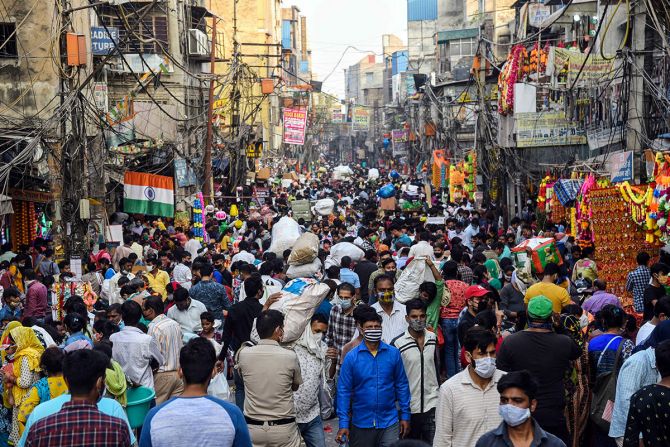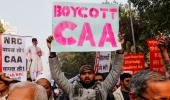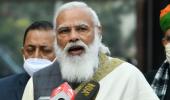The government on Friday strongly rebutted a Freedom House report downgrading India's status to a "partly free" country, calling it "misleading, incorrect and misplaced", and asserted that the country has well established democratic practices.

While the ministry of information and broadcasting stressed that the country treats all citizens equally without discrimination and that discussion, debate and dissent are part of Indian democracy, the ministry of external affairs said India has robust institutions.
The MEA also took a dig at the Democracy watchdog, saying India does not need "sermons", especially from those who cannot get their basics right.
A new report by Freedom House, a US government-funded NGO, released on Wednesday had also claimed sustained erosion of civil liberties in India.
"The Freedom House report, titled 'Democracy Under Siege', in which it has been claimed that India's status as a free country has declined to 'partly free' is misleading, incorrect and misplaced,” the MIB said in a statement.
Asked about the report at a media briefing, MEA spokesperson Anurag Srivastava said, "The political judgements of Freedom House are as inaccurate and distorted as their maps."
Srivastava was referring to a wrongful depiction of India's map by Freedom House.
"For example on the COVID-19 situation, there is a widespread appreciation in the world of our response, of our high recovery rate and of our low fatality rate," he said.
"India has robust institutions and well established democratic practices. We do not need sermons especially from those who cannot get their basics right."
In a detailed rebuttal, the MIB said, "Government of India treats all its citizens with equality as enshrined under the Constitution of the country and all laws are applied without discrimination."
It said due process of law is followed in matters relating to law and order, irrespective of the identity of the alleged instigator.
"With specific reference to the North East Delhi riots in January 2020, the law enforcement machinery acted swiftly in an impartial and fair manner. Proportionate and appropriate actions were taken to control the situation. Necessary legal and preventive actions were taken by the law enforcement machinery on all complaints/calls received, as per law and procedures."
The government statement also rebutted the allegation in the report that the COVID-19-induced lockdown "left millions of migrant workers in cities without work or basic resources" and "resulted in the dangerous and unplanned displacement of millions of internal migrant workers".
It said the lockdown was announced to control the spread of the coronavirus and the period allowed the government to ramp up production capacity of masks, ventilators, personal protection equipment kits, etc. and thereby effectively prevent the spread of the pandemic. "India has, on per capita basis, registered one of the lowest rates of active COVID-19 cases and COVID-19 related deaths globally.
Rejecting the report's claims that academicians and journalists were intimidated, it said, “Discussion, debate and dissent is part of Indian democracy. The Government of India attaches highest importance to the safety and security of all residents of the country, including journalists."
The Centre has issued a special advisory to the States and Union Territories on safety of journalists requesting them to strictly enforce the law to ensure safety and security of media persons, the statement added.
The report had also claimed that though the private media are vigorous and diverse, and investigations and scrutiny of politicians do occur, but “attacks on press freedom have escalated dramatically under the Modi government, and reporting has become significantly less ambitious in recent years. Authorities have used security, defamation, sedition, and hate speech laws, as well as contempt-of-court charges, to quiet critical voices in the media”.
Responding to this assessment, the government statement said that 'Public Order' and 'Police' are State subjects under India's federal structure of governance.
“The responsibility of maintaining law and order, including investigation, registration and prosecution of crimes, protection of life and property, etc., rests primarily with the concerned state governments. Therefore, measures as deemed fit are taken by law enforcement authorities to preserve public order,” it added.
The report has also alleged that a “wide variety of NGOs operate, but some, particularly those involved in the investigation of human rights abuses, continue to face threats, legal harassment, excessive police force, and occasionally lethal violence”.
Rebutting this, the government said the Indian Constitution provides for adequate safeguards under various statutes, including the Protection of Human Rights Act 1993 for ensuring protection of human rights.
On the report's claim that the authorities used assembly bans, internet blackouts, and live ammunition between December 2019 and March 2020 to quell widespread protests against the Citizenship Amendment Act and proposals to roll out a citizens' registration process across the country, the government said, "...the temporary suspension of telecom/internet services is resorted to with the overarching objective of maintaining law and order under strict safeguards."
The government also rebutted the claim that the Foreign Contributions Regulation Act amendment led to freezing of NGO Amnesty International's assets, and said the NGO had received permission under the FCRA Act only once and that too 20 years ago (December 19, 2000).
“Since then Amnesty International, despite its repeated applications, has been denied FCRA approval by successive governments since as per law it is not eligible to get such an approval. However, in order to circumvent the FCRA regulations, Amnesty U.K. remitted large amounts of money to four entities registered in India, by misclassifying the remittance as Foreign Direct Investment,” it said.
“This malafide rerouting of money was in contravention of extant legal provisions."










